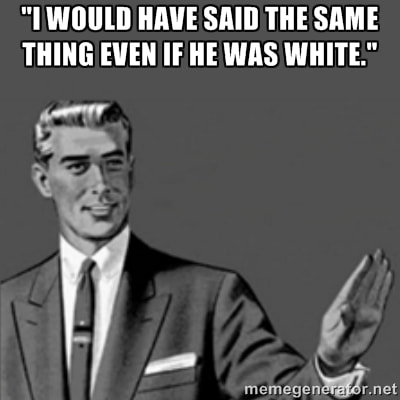|
You’ve probably heard it before: “I would have said that even if [fill in the person’s name] was white.” It’s a tried and true method of distancing oneself from actions that are based on white superiority. I know this, because I’ve used it, and hear others use it. Typically, it is white people who employ this technique, and I’d like to apply some analysis to the dynamic. (I won’t claim that people of color never use this distancing method, though if they do, there is a different dynamic going on and it’s not appropriate for me, as a white person, to analyze that dynamic.)
There may be some back-and-forth about who is right, but at some point Fred or a third party witnessing the exchange, says, “William, do you see how you confronted Fred in a totally racist way?” “No. It has nothing to do with race. I would have said the same thing if Fred was white.” The implication is that the dynamics of race have everything to do with the race of the Other. So, if William would have said the same thing, regardless of the Fred’s racial identity, then race is not a factor. The problem is, that’s not how racial dynamics work. Fred is not the only person with a race in this exchange. Would William have said the same thing if he himself had NOT been white? I expect he would answer, “Of course! Because I am right, and truth is important and beyond race. Stop playing the race card!!” Theoretical William’s assertion notwithstanding, it’s still an important question to ponder: How does his whiteness, his socialization into a racially “superior” group, affect his approach to disagreement? I’m not interested for now in the racial identity of the Other, but in William’s own racial self-understanding. After all, you can’t really argue with William’s hypothetical, “If everything about this situation were exactly the same except that Fred was white, I would have responded exactly the same way,” except to say, “No you wouldn’t have.” “Yes I would.” “Nuh-uh.” It get’s nowhere, and it distracts from William’s own racial identity. White people have been socialized to believe that we are superior. Of course, it’s more complicated than just that, often with a mix of guilt, shame and self-loathing, but I have yet to meet a person who receives systemic white racial privilege who has not internalized that privilege into a form of superiority. And I’ve met a lot of white people. That doesn’t make white people bad or evil or blameworthy. But it means that we have a lot of work to do to uncover how these internalized messages play out in our lives. For William, myself, and other white people, we are socialized to believe that
All of these, and more, manifestations of white supremacy are at play in every interaction a white person has with anyone else, regardless of the other person’s racial identity. This is how we have learned to interact with other people because this is what we believe about ourselves. We don’t have to keep believing these messages, or acting them out, but if we ignore the reality of our socialization it is at our peril. This doesn’t mean that every time William disagrees with a person of color or another white person, that he shouldn’t say anything. White people are right sometimes — even about very important things. But we must develop patterns of reflection that allow us to expose the internalized superiority that props up our assertions and assertiveness in all of our interactions. This will make us healthier people and allow us to enter into more authentic relationship with people of all racial identities.
0 Comments
Leave a Reply. |
AuthorRoots of Justice trainers and friends share reflections on historical and current events Archives
April 2024
Categories
All
|
© Roots of Justice, Inc. All rights reserved.


 RSS Feed
RSS Feed